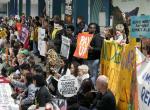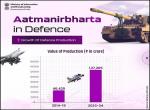Coming from the pen of a retired IAS officer this paper may appear to be a little strange, but as a young officer in the districts I have interacted with the police in happy times and in times of stress. I have witnessed the strength and the weakness of the police, observed its shortcomings, but also experienced the difficult duty of a policeman, his loneliness, his devotion and his willingness to take even those risks which endanger his life. Therefore, despite all the salvoes of abuse that a police man has to face from so-called civil society, I thought it deem and proper to try and present a policeman’s perspective also --- just to set the record right.
Do we need the police? That question was answered for me about 53 years ago when I was a young Assistant Collector in Morena, then the very epicenter of dacoity in India. This was the land of Man Singh, Lakhan, Rupa, Gabbar, Amritlal and Putli, all dacoits of ill-famous renown or notoriety. There is a remote police station at Birpur (now in Sheopour District) which formed the constant focus of complaints by the local MLA, one Nawal Kishore. Every complaint had been inquired into, including through a magisterial enquiry conducted by the Sub-Divisional Magistrate and all had been found to be exaggerated, false or worse.
The MLA obviously wanted to dominate the police and the complaints continued. One morning E.B. Reinboth, the D.C. and D. M., who was my boss, told me to sit in his jeep and we drove off for Birpur, about 180 kms from the district headquarter. On reaching Birpur Police Station, he sent for the MLA, who again launched into a tirade against the Station Officer. Hearing him out Reinboth told the Inspector, “Thanedar Saheb, it is obvious that you and your men are not welcome in Birpur. Therefore, I am ordering the police station to be closed. You and your men should pack your things and report to the Police Lines in Morena. Meanwhile, you should announce by beat of drum in all the villages in your jurisdiction that the D. M. has closed the police station and now Birpur will have no police presence. When it sank into the MLA that Reinboth was really serious, he said that this was an open invitation for dacoits to pour in to Birpur because there would be no police presence there. He then virtually fell at Reinboth’s feet and begged him not to shut the police station. The drama ended only when Nawal Kishore promised never again to make false complaints. But for me the lesson become indelibly printed in my mind --- civilised society needs the police. The question is does society realise this?
The recent rape and murder of a 23 year old girl in a bus in Delhi has, very rightly, aroused anger, focused attention on the fate of women, on sexual offences and the feeling of insecurity in our towns and villages and the extreme callousness of large sections of society towards women and disregard for their dignity. Sexual crime is symptomatic of a deep rooted malaise, of disregard of law and the rapid growth of a feeling that we can do what ever we want, free of both a sense of guilt at wrongdoing or fear of dire consequences for misdemeanor and worse. Where sin does not invite retribution how does one build a society of laws? Anger has spilt on to the streets and government has been forced to take action. Whether the anger will last and action will be sustained remains to be seen.
Almost coterminous with the rape case was the ambushing of a routine army patrol on the LoC in the Mendhar sector of J and K and the killing of two jawans by Pakistani troops. The body of one soldier was mutilated and one corpse was beheaded and the head taken away in an act of barbarity which one could attribute to Genghis Khan’s Mongols, but not a 21st century army which accepts the Geneva Convention. Naturally the nation was outraged and up in arms to an extent that it would have supported government if it decided to go to war on this issue. Even the usually reticent Manmohan Singh gave a strong message to Pakistan and we put further confidence building measures on hold. One felt happy that India stood behind its soldiers. Even activists from so called civil society, except for a few who have always put India in the dock and have advocated abject surrender by us on all issues, expressed their horror.
However, one did note four discordant notes. When Parliament was attacked by terrorists and nine persons, including five policemen, were killed in defence of parliament, the accused who masterminded the attack were arrested, tried and sentenced. Afzal Guru, the ringleader, was awarded the death penalty, which was upheld by the Delhi High Court and the Supreme Court. Activists led by Arundhati Roy mounted a campaign to save Afzal Guru and he has not been executed to date. This shrill campaign on behalf of a convicted terrorist had not one word of remorse, neither condolence, nor sympathy, nor compassion for the policemen who died defending parliament or for their widows and children. 76 CRPF men were killed in Bastar in a single ambush by Naxalites. Did civil society activists sympathise with the victims? One of them had the nerve to tell me that policemen should know that when they join the police they are inviting death. It is only because the gentleman was a guest in my house that I refrained from strangling him.
No act of barbarity is acceptable and one against a soldier doubly so. But what about the recent killings of 11 C.R.P.F jawans in Latehar District of Jharkhand? Their bodies were booby trapped and when the relief force picked up one it exploded, injuring many jawans. In one case the stomach of a corpse was cut open, stuffed with explosives and re-stitched. The body was sent for post mortem examination and but for the alertness of a doctor who noticed the tampering of the body and notified the police the body would have exploded in hospital and more people would have been killed or wounded. Is what the Naxalites did to bodies of the slain policemen not an act of vandalism and barbarism at par with what the Pakistanis did to the jawans murdered near the LoC? But our civil society members did not bat an eyelid and they certainly did not utter a word of sympathy.
The fourth incident besides the three cases stated above is of the brutal murder of two policemen deputed for the security of the Collector of Sukma when he was abducted by Naxalites. One was a Muslim and the other a tribal. I am sure they must have had families and loved ones who must have survived on the wages of these two men. Do they not bleed when they are cut, feel the cold in the winter and heat in the summer? Are they not human? My stomach turns with revulsion at the utter callousness of our activists, who look on the policemen as Untermenschen, or lesser beings.
Why is the police looked upon this way? I have already given an example of how much people really need the police for their own protection from anti-social elements. Therefore, the police must introspect on why so many people are either indifferent to the police or positively dislike it. There is a general perception that a police station is an unfriendly place, policemen are rude and corrupt and that they torture people. Starting with the negatives, I agree that many police stations are best avoided. Let me give a personal example from 1979, when I was head of the Delhi Development Authority and was, therefore, a man of some consequence and authority in Delhi. On an evening walk near Tuglakh Road Police Station I found a person lying in a gutter. Not knowing the state of the person I walked into the Police Station and went to the desk of the Head Constable Moharrir, or station writer. I reported the matter to him and requested him to send someone to find out if the man was dead, drunk or otherwise incapacitated and to render necessary aid. The policemen’s reply was, “Tu ney mara hoga” (You must have hit him.) I was furious at this and shouted at the man.
Hearing the commotion the Station Officer came out to see what was happening and, recognizing me, asked how he could help. I narrated the Head Constable Moharrir’s behaviour and told the Inspector that if this is how his officers behaved how he could ever expect people to help the police. Of course, the Station Officer was apologetic, sent a constable to look at the man in the gutter, who reported that he was a drunkard and that the police would look after him. The fact remains that not only are Police Stations places to be avoided, but also that there is a command failure because senior officers do not educate their subordinates about how they should behave with citizens. More on this later.
The cutting edge level of the police is the police station. Under Chapter XII Cr.P.C. the entire scheme of investigation of offences centers around the police station. The Station Officer is the most visible symbol of the police, which is why the Thanedar, or Station Officer, is so feared, especially by wrong doers. The Thanedar is the backbone of the Police, just as the Tehsildar is of general and revenue administration. One example will illustrate the point. The place of landing of the ten Pakistani terrorists who held Bombay to ransom in 2008 was in the jurisdiction of the Colaba Police Station. The terrorists were sighted by a fisherman, but being unchallenged they dispersed to their designated destinations, resulting in 166 deaths and several hundreds of injuries. Had the Colaba Police Station been adequately manned, trained and equipped with transport and communication facilities, with proper modern weapons and a proper beat system, the terrorists would probably have been seen and questioned by the beat constable. Sensing something suspicious he would have called up the police station which, if it had responded swiftly, could have brought the terrorists to encounter at or near the place of landing. The history of 26.11.2008 would then have been different. Our neglect of Colaba Police Station, of all police stations throughout India, cost us dear then and costs us even more now. It is only Andhra Pradesh which fortified its police stations in Naxalite areas, which is why a successful attack on a police station there is a rarity and Naxalism has been brought under control.
Behaviour apart, the Police has to face a really critical shortage of manpower. Even against existing vacancies there are approximately 4.5 lakh posts which have to be filled. Internationally, perhaps the standard strength of the police is approximately one policeman for 160 people. Delhi is the only city in India which has an approximate strength of one policeman for 168 people. In Madhya Pradesh the proportion is approximately one policeman for 834 citizens. The total strength of the Madhya Pradesh Police is about 89,000 whereas if we were to aim at one policeman for every 250 citizens the State would need a Force of approximately three lakh policemen. The cities of Indore and Bhopal should have police strength of 8,000 each, whereas there are just about 3,000 personnel per city. The position in most States is that the Police Force just does not have the numbers to provide for adequate policing. Rural India, by and large, is still peaceful, which is why in a State such as Madhya Pradesh a police station can look after approximately 100 villages with a standard strength of one Station Officer, two Head Constables and twelve Constables. Nevertheless, whether it be a city, a town, a cluster of villages, there is hardly any police presence. Without an adequate force the district head of police cannot organise proper beat patrols, manage traffic, have men posted to sensitive or critical locations and patrol the public transport system with sufficient manpower in order to deter crime.
The question is not that rapes, dacoities and murders take place. The question really is why the number of heinous crime is still manageable despite the fact that there is inadequate police presence. I can think of two reasons, the first of which is that by and large we are a law abiding nation. The second, equally important reason is that our police is a great deal more efficient than civil society credits it to be. To quote just one case, in 1963 when I was D.M. Betul, a lad of about nineteen years made some indecent advances at a teenaged girl, who was the daughter of a leading local advocate, as she was returning home from school. A passing Constable immediately caught him and brought him to the police station. The Station Officer, a wise experienced officer, saw to it that the challan was put up within twenty-four hours and the Magistrate remanded the man to judicial custody. Three days later, without any provocation, a local trouble maker tried to foment an agitation in which he roped in the students of a college. The Superintendent of Police and I were sitting in my house having a cup of tea when we heard that there was trouble in the bazaar and shop keepers were downing their shutters. We immediately rushed to the site and what we saw greatly reassured us. There was a menacing crowd of about 300 people being confronted by a single unarmed Head Constable. He warned the crowd to stay put and angrily told the ring leaders that if they advanced one more step he personally would break their heads. No one dared to advance because this single jawan, confident in his moral and legal authority, stood like a rock.
Today the position is that we have systematically engendered disobedience of laws, contempt for laws and constant disempowerment of the forces of law and order. In section 188 of the Model Police Bill drafted by the Soli Sorabji Committee the following words have been used, “The State Government shall take effective steps to ensure that the average hours of duty of a police officer do not normally exceed eight hours a day provided that in exceptional situations the duty hours of a police officer may extend upto twelve hours or beyond. In such cases adequate compensation and facilities shall be provided to the police personnel”. What is the ground reality? In 1978 there was an unusually heavy monsoon in Delhi and there was fear that there would be large scale flooding. I was head of DDA and the Lieutenant Governor asked me to take charge of large parts of Delhi, especially East Delhi. Near the DDA headquarters (then at Vikas Minar) a Constable stood on duty at the crossroads from where one moved towards the IP Bridge. The Constable stopped my vehicle and requested information about the flood situation in Kingsway Camp Police Lines where his family lived. He told me that he had been continuously on duty for forty-eight hours, without food and in the wet clothes that he wore and he was completely out of touch with his family. I told my own security personnel to take the man to my office, let him have a shower, give him change of clothing and feed him, whilst deputing one of the policemen with the DDA to take over the man’s duty. His officers had not bothered about him and I told the Police Commissioner the story later on. However, this dedicated officer stood at his post regardless of the fact that he had neither eaten nor had news of his family. That is a picture of a policeman that the activists refuse to see or acknowledge.
If the police force is woefully short of requirements policemen will have to work long hours. On law and order duty when men have to stand around virtually waiting for something to happen they are bound to become tired, hungry and irritated. Rameshwar Nikhra, a Member of Parliament who had been Chairman of the State Bar Council, once told me that as a student leader in Jabalpur he frequently led student agitations, to control which the police was deployed. On one occasion when the students became violent the police had to use force to disperse them. One of the lathi wielding policemen was laying about him with gusto, shouting, “Because of you I have been standing here, thirsty and hungry, for the last three days. Now let me teach you a lesson”. Nikhra said that at that time he was naturally upset with the police, but on introspection he realised that the policeman had a point. I state this story not because I appreciate or condone brutality by the police, but we would be foolish to overlook the stress and tension under which our policemen operate. Society does nothing to make life easier for a policeman. The Soli Sorabji Committee has recommended that a police station should be neat and clean, with a comfortable room for visitors. There should be separate toilets for men and women, a women and child protection desk, separation of normal police duties and investigation of crimes. All this is possible only if the police strength is sufficient to deploy the manpower for performing all these separate functions. The fact is that adequate manpower is not available and, therefore, the average policeman, especially below the gazetted ranks, will always be under immense pressure and will have to function in an environment in which he will never have adequate facilities. Till this is remedied the police will not function in the manner in which a good police force does.
I stated earlier that there is a command failure. When the Central Reserve Police mutinied some years ago one officer of the rank of DIG from the Madhya Pradesh Cadre tried to reason with the men at Neemuch, where the Force was created by the British. The men told him that they personally respected him but requested him to step aside because they said that he could not in any way help the men and, therefore, they had decided that they would confront government. In other words, the men have lost their faith in their officers and this can only happen when there is failure of command. There are many reasons why this has happened, the first of which is that in appointment of the State DGP every Chief Minister opts for a pliable officer rather than an efficient one. Obviously a pliable officer will take orders from politicians even in matters where under law he is the only person who has the mandate. For example, under the Code of Criminal Procedure, in the matter of investigation it is only the Police who have the authority, which has to be exercised under judicial supervision. The Executive has absolutely no authority in this behalf, but whether it is Delhi Special Police Establishment (CBI) or the State Police it is a well known fact that investigation is definitely influenced by politics and politicians. If the DG Police will not resist how can the investigating officer at police station level show independence? In fact in all departments of government there is the ever increasing malaise of officers operating not according to law but according to whims of politicians. A law is framed by the Legislature and every person involved with implementation of law has a legal mandate. Despite this in the current political scenario officers take orders, including illegal ones, from politicians without pointing out to them why a particular thing cannot be done in law. Our answer to political interference is the setting up of committees and framing of Model Police Acts. For example, the model law drafted by the Soli Sorabji Committee, in section 6 speaks of the selection of the Director General of Police from three senior most officers empanelled by the State Police Board, with the DG being given a minimum tenure of two years. Let us compare this with how Vice Chancellors of universities are selected. In Madhya Pradesh (this system prevails throughout the country) the Vice Chancellor is selected from a panel of two or three persons whom a high powered search committee has identified and recommended. The Search Committee consists of a representative each of the Chancellor, the Executive Council of the University and the University Grants Commission, all three completely different and independent authorities. Despite this some of the worst persons one can think of are empanelled as Vice Chancellors, are appointed as such and have a tenure of four to five years. At least in Madhya Pradesh some of the worst scoundrels have been appointed as Vice Chancellors. That does not mean that we should not introduce complete honesty in the selection of the DG Police, but till we take drastic steps to rid the All India Services of deadwood and dishonest officers we shall not have the best people being promoted to head the police.
One major cause of breakdown of command is the almost total disempowerment of senior police officers by the politicians. In any organisation, but especially in a uniformed service, the hierarchical structure has to be clearly defined and the disciplinary authorities have to be given sufficient power to maintain discipline. Now even in the matter of postings and transfers even the D.Gs.P. have been left at the mercy of politicians. In Madhya Pradesh Arjun Singh centralised all transfers and Digvijay Singh gave all powers of transfer of even the lowliest functionary to the Minister in charge of a district. In all departments, particularly in the police, officers suddenly found that they had lost control over their subordinates. When policemen found that the S.P. and other superior officers could no longer shift them, even on compassionate grounds, they naturally sought political patronage and this absolutely destroyed the command hierarchy. Under these circumstances, there was bound to be a command failure and this has put paid to effective policing. It is in the interest of the police, of people at large and of the nation that senior officers are once again empowered, command restored to them and then they are held accountable for effective, honest, citizen friendly policing.
We have to find a way of creating more K.F. Rustomjis and totally eliminate the Rathores of Haryana ill-fame from the Service. In this behalf I would strongly suggest to the IPS Association, Central and in each State, to understand that they are one of the three foremost Services in India and that no one has a greater responsibility than they themselves to cleanse their ranks of the corrupt, the inefficient and those who use flattery to promote themselves.
A person who has achieved a level of command has the onerous task of actually commanding. A Superintendent of Police who takes a bribe from his Sub Inspectors cannot be expected to either lead the Force or to motivate it to truly serve the citizens. An IG or DGP who has achieved the rank through political manoeuvring can neither expect the respect of his Force nor can he command and guide the Force to serve the people. That makes it all the more important that the Force should cleanse itself at its own initiative.
Unlike the so-called civil society I like policemen and I admire the fact that they perform very difficult tasks under daunting circumstances and are the guardians of the security of the nation. There are more Ombleys in the Police than civil society gives credit for. Let us honour the policemen who dedicate their lives to our security. Let us not constantly attack the police as being anti people, but let us try and understand why the police image has taken such a beating. It is the duty of society to create an environment in which the police can do its duty. Once that happens I am for hanging rogue policemen, but I am not prepared to collectively call the Police rogues.
Published Date: 29th January 2013










Post new comment